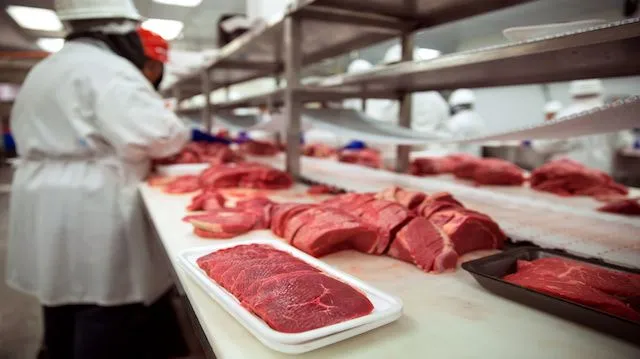
- Share on Facebook199
- Share on Pinterest
- Share on Twitter
Coal power plants, diesel engines, meat-heavy diets. They all have one thing in common — pollution. Cutting back on red meat could not only reduce the amount of greenhouse gases in Earth’s atmosphere, but it could also save you money and add years to your life. That’s according to a new report published in the Proceedings of the National Academy of Sciences.
The meat industry is a dirty business
Greenhouse gas emissions from our food system make up more than a quarter of the noxious chemicals in our air. Turns out, one of the ways we can reduce these emissions, despite the fact that it’s pretty unlikely to happen, is for everyone in the world to change their diet. While different parts of the world would reap varying degrees of benefit from the change, the report found that people in the Western world would benefit the most from a shift to a more plant-based diet. This is hardly surprising news. Most Americans could stand to eat a few more vegetables in place of meat on a regular basis.
In fact, eating a diet that relies more on plant-based foods, and less on meat and dairy products, could reduce global mortality between six and 10 percent. As a bonus, greenhouse gas emissions could be reduced by 29 percent to 70 percent according to projected greenhouse gas emission rates for 2050. It would also save all of us a load of money.
“Overall, we estimate the economic benefits of improving diets to be $1 (trillion) to $31 trillion U.S. dollars,” wrote the authors of the report, “which is equivalent to 0.4 to 13 percent of global gross domestic product (BDP) in 2050.” Those savings are largely from medical care that would not be needed if more people ate less red meat.
Different scenarios, different benefits
A wide variety of scenarios are outlined in the report, from the idealistic scenario in which every person on Earth ate a vegetarian or vegan diet to some that are more realistic. For example, in one scenario, if everyone on Earth ate 25 percent more vegetables and fruit and 56 percent less red meat, we could see a 29 percent reduction of greenhouse gases and 5.1 million lives could be saved per year. However, these numbers are simply an average, and a breakdown of the numbers should give you pause for thought.
As Marco Springmann, one of the authors of the study and a research fellow at the Oxford Martin Programme on the Future of Food, points out, certain parts of the world would have to change in significant and, frankly, unrealistic ways. Huffington Post reporter Nick Visser noted that sub-Saharan African populations would have to eat 190 percent more produce, and people in high-income Western countries would have to reduce red meat consumption by 56 percent. So maybe all we can hope for are moderate changes, but even moderate changes in our diets could do us all a world of good.
As we’ve previously reported, red meat is dangerous to our health. In October 2015, the World Health Organization’s International Agency for Research on Cancer stated that red meat is probably “carcinogenic to humans.” Consuming large amounts of meat products also contributes to conditions and diseases like prostate and breast cancer, bowel cancer, heart disease, type 2 diabetes, high blood pressure and autoimmune diseases.
Dairy and meat farms pollute the environment in other ways too. Unabsorbed antibiotics filter into our waterways, and literally tons of cow manure pollutes groundwater and soil around farms. So while the results in the recent report published in the Proceeding of the National Academy of Sciences may sound a little pie in the sky, it would do everyone a lot of good to rely more heavily on plant-based food.
Have you given up red meat for the sake of your health or the environment? Tell us about your experience.
—Megan Winkler
Megan Winkler is an author, historian, Neurosculpting® meditation coach, certified nutritional consultant and DIY diva. When she’s not writing or teaching a class, Megan can be found in the water, on a yoga mat, learning a new instrument or singing karaoke. Her passion for a healthy mind-body-spirit relationship motivates her to explore all the natural world has to offer.
Sources:
http://www.huffingtonpost.com/entry/climate-change-meat-fruit-vegetable_us_56f019e5e4b09bf44a9de1ed?ir=Green§ion=us_green&utm_hp_ref=green
http://www.pnas.org/content/early/2016/03/16/1523119113
- Share on Facebook199
- Share on Pinterest
- Share on Twitter

